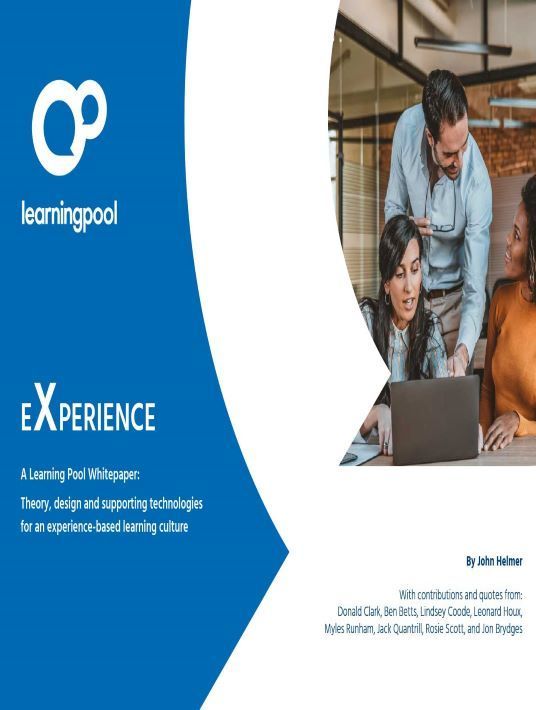The Search For A Definition
What exactly is the definition of a learning experience? This paper might seem ambitious in scope, but it had a very simple starting point. Learning Pool was in the process of launching a new type of learning system called Stream into the market, which the company thinks of as a Learning Experience Platform or LXP. However, not everybody outside the company seemed to agree that LXP was what it should be called.

There was—and still is—some uncertainty in learning circles about what we should dub this new type of learning system. The term LXP might be taking the lead, but other terms are still in the running. The debate continues, with the grounds of contention seeming to be chiefly around the word experience, the "X" in LXP.
Why Is This Word So Contentious?
Does the lack of agreement signal a deeper unease about the definition of a "learning experience"? Asking that question led us to a wider consideration of what exactly we mean when we talk about "experience" in the context of organizational learning, and how that might relate to the learning theory of the past on experience and learning, as well as the trends in the wider world today. This begs the question of what it all might mean for the chief preoccupation of most L&D departments today; how they can drive value for their organizations through the fostering of a strong learning culture.
But first, let’s dig into the "e" word a little.
X Marks The Spot
Adding an "X" to an acronym automatically tends to confer an air of mystery. We’re used to associating this final letter of our alphabet with something missing, omitted, or deliberately concealed, like the spot on a treasure map where they buried the gold. X is a wild card, an unknown. It could mean nothing or everything. TV pop talent is said to have the X-factor. X-rays might tell you how long you have to live. Such a range of possibilities give the letter an ambivalent, and therefore all the more powerful, charge. This charismatic character dangling off the end of that line of 25 more functionally inclined letters somehow ups the ante wherever it is added. In xAPI, for instance—or LXP.
Perhaps this is why, in the war of TLAs (three-letter acronyms), the LXP seems likely to triumph over the more pedestrian LEP. However, some reject the word "e" stands for in those two TLAs altogether—experience.
In the Learning Pool whitepaper, Powering The Modern Learner Experience, this is discussed, and the view of Craig Weiss, who dislikes the term Learning Experience Platform because "it really makes no sense…everything we do can turn into a learning experience," is noted. And yet more and more people are talking about learning experiences. Google searches for the term "learning experience" and its definition have increased steadily over the last decade and a half, while searches for the "learning course" have declined equally steadily during the same period. We now have a new job title in L&D, a learning experience designer. Clearly the term has meaning for some.
Others clearly dislike the term in the ways it is currently being deployed. Others, while broadly in favor, express reservations about what might get overlooked or smuggled in with this new way of speaking. Then again, there are those who rather cynically adopt the language without changing in any particular way what they are already doing; and an LMS, overnight, becomes an LXP, courtesy of the marketing department without a line of code having been changed.
Do these disputes really matter, though? Is it not simply pedantic to pick up on the different terms people use?
What’s In A Name?
Changes of terms across an industry often signal significant changes of thought and opinion. And often these changes come about not through the relatively orderly process of academic publication and citation, but through a communal agreement mostly tacit and unspoken. No, we won’t use those terms anymore, we’ll use these ones—said nobody ever (apart from bloggers); it’s just understood. As if through the operation of some Jungian collective unconscious in learning, people just start talking that way.
In a practice-focused domain like organizational learning, such changes of wording are almost never merely at the whim of fashion, however. They happen by necessity. So we need a theory for why we use the "experience" word so much now and why, despite its widespread currency, there still seems something slightly mysterious about the space it occupies that leads us to mark it with an "X."
Resources Not Courses
Arguably, "learning experience" became more useful as a term once it was widely believed that we needed to move beyond the training course as the default mode of instruction in organizational learning. Nick Shackleton-Jones was perhaps one of the most high-profile—though certainly not the only—learning guru to point out that the over-reliance on courses was, in the age of Google, becoming counter-productive. What had once been a means of disseminating information—quite an efficient one by the standards of the time—was now beginning to look more like a mechanism for hiding it: locking information away within an unsearchable content wrapper.
As the rapid growth of internet-connected personal devices such as smartphone put these tools into the pocket of every employee, it seemed less and less efficient to carry on disseminating information to employees in the form of courses (either offline or online) many of which were little more than recitals of facts and processes to be memorized, an end that might be better achieved through checklists or cheatsheets. Momentum grew behind the Shackleton-Jones idea of "resources not courses," a mantra that achieved widespread use and has since become his catchphrase (he fears it might end up on his gravestone).
Atom-Smashing
However, smashing up an entity like "the course" which had seemed so fundamental to training for so long was a bit like splitting the atom, not only in that it produced a surge of energy, but also in that it released and revealed constituent particles, which now had to be studied and named. The "content" particle is the easy one to identify. But once you have stripped out the informational content from a course and turned it into a set of resources, what remains? Surely it would be too reductive to say there is nothing else. But that something else, it seems, might potentially be slippery and harder to pin down.
Shackleton-Jones is not in any doubt; he says we should be creating two types of things, resources, and experiences. Those are the two particles, if you like, that he implies have resulted from the nuclear fission that happened in that atom-splitting moment when we began to move beyond the limiting idea of the course.
So should we just ignore Craig Weiss’s slightly bad-tempered assault on the idea of a learning experience and just accept it as the new elemental particle, alongside informational content, which makes up what we used to think of as a course?
For complicated reasons, I can’t quite agree 100% with Craig Weiss, but I think there is something in his basic objection to the term "learning experience" (it is too broad and all-inclusive) that deserves consideration. If anything at all that happens to us during the day can be a learning experience, then how can we throw a boundary around the definition of this thing we call "a learning experience"? Where are its edges?
It turns out that a learning experience is far harder to define than a learning resource. And this is where some of the mystery creeps in. We all might feel that we know what we mean when we use the term learning experience. In popular jargon, it has quite a clear meaning. When someone says, "Well, that was a learning experience," we understand that something has happened to them (e.g., "I won’t run with scissors again.").
But when we use the phrase in the context of L&D, do we use it with a similarly clear sense of common understanding?
In Conclusion
Download the eBook eXperience: A Learning Pool Whitepaper and find out more about the definition of a learning experience, the Learning Experience Platforms, and their possible applications to your organization.









